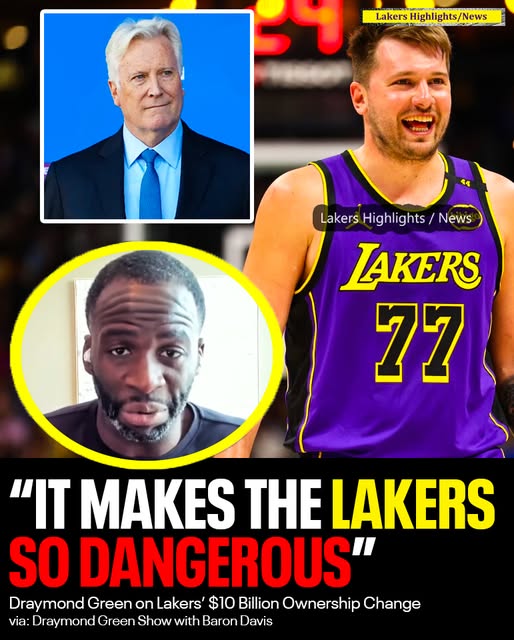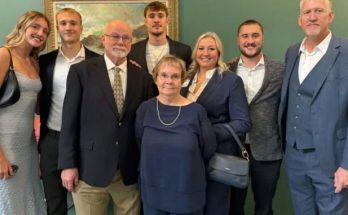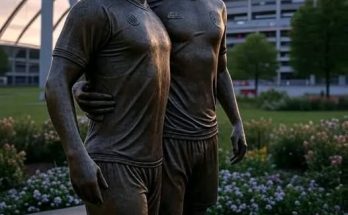Draymond Green, never one to shy away from speaking his mind, has once again placed himself squarely in the center of the basketball world’s biggest conversation. In the wake of the Los Angeles Lakers’ historic \$10 billion ownership change—a record-setting transaction that instantly reshaped the NBA’s financial and competitive landscape—the outspoken Golden State Warriors veteran offered his unfiltered take. As always, Green delivered his thoughts with characteristic candor, merging sharp analysis with a competitive edge that made it clear he understands the gravity of what’s unfolding in Los Angeles. And while the league itself braces for the ripple effects, Draymond’s voice has added yet another dimension to the discussion: raw, unscripted, and undeniably compelling.
The Lakers, one of the most storied franchises in all of sports, were recently sold in a stunning deal that has left fans, analysts, and insiders alike buzzing. The \$10 billion valuation—by far the largest in NBA history—drew headlines not just for its sheer size, but for the caliber of investors involved. Reports confirm that the new ownership group includes tech moguls, global entertainment powerhouses, and even a few former athletes. The move ends the Buss family’s decades-long reign over the purple and gold empire, a stewardship defined by championships, superstars, and an indelible mark on pop culture. For Draymond Green, a four-time NBA champion and perennial provocateur, the implications go far beyond the headlines.
Speaking on his popular podcast and during post-practice media availability, Green shared his perspective on what the ownership shift could mean not only for the Lakers but for the broader NBA ecosystem. “You don’t just spend \$10 billion to sit on your hands,” Green said. “That’s a move that signals ambition. That’s a message to the league—and to teams like us—that the Lakers are coming for everything.”
He wasn’t wrong. The ownership change isn’t just about dollars and cents. It’s about power, influence, and vision. Green pointed to the potential domino effect this could have on team valuations across the NBA, particularly in light of the league’s upcoming media rights negotiations. “If the Lakers are worth \$10 billion today, what are the Knicks worth tomorrow? What does that mean for the Warriors? The Celtics? The Bulls? This changes the math for everyone,” Green continued. “It sets a new floor. And you better believe owners around the league are watching closely.”
But perhaps more than the financial implications, Green seemed acutely aware of the competitive threat this new ownership group could pose. While the Lakers are already one of the most powerful brands in global sports, the infusion of this level of capital—and the ambitious leadership that typically accompanies such an investment—could accelerate their rebuild, reshape their strategy, and even supercharge their free agency approach. “Imagine what happens when the Lakers suddenly have the most aggressive front office, the best training staff, the most advanced analytics department, and the freedom to spend however they want,” Green said. “This isn’t just a business play. This is about winning. And I’ve played against the Lakers long enough to know—when they care about winning, they’re dangerous.”
That point struck a chord with many around the league. The Lakers have long walked a fine line between their Hollywood image and on-court dominance. At times, critics have accused them of leaning too heavily on their brand, relying on past glories rather than investing in the infrastructure needed to sustain long-term success. But if Green is right, this new ownership group could signal a departure from that model—and a return to the ruthless, dynastic intent that once defined the franchise during the Magic Johnson and Kobe Bryant eras.
Green also reflected on the symbolic significance of the Buss family’s departure. “Love them or hate them, the Buss family is Lakers royalty,” he said. “They gave the NBA some of its greatest moments. I grew up watching their teams, and as a player, you always knew what they stood for. But times change. And maybe this is the kind of bold move that gets the Lakers back to being the Lakers.”
His comments were laced with both respect and skepticism. Green acknowledged that while the money and vision are impressive, success in the NBA still boils down to execution. “Money helps. It helps a lot. But you still gotta make the right picks. You still gotta land the right free agents. You still gotta manage egos and build chemistry and get through injuries and drama and everything else that comes with a long season,” he said. “So yeah, \$10 billion is cool. But I’ll believe the results when I see them.”
Yet even with that measured caution, it’s clear Green sees the potential for something seismic. He noted that ownership stability—or instability—can be the difference between sustained excellence and perennial chaos. “Look at the Spurs, the Warriors, the Heat. Great ownership, consistent leadership, vision—that’s what wins titles. If the Lakers just bought themselves that kind of future, everybody better watch out.”
Social media quickly lit up with reactions to Green’s remarks. Some praised him for bringing attention to the bigger picture, calling his analysis both insightful and brutally honest. Others accused him of stoking unnecessary drama, suggesting that Green was trying to plant seeds of doubt ahead of what could be a Lakers resurgence. But controversy is nothing new for Draymond. His willingness to challenge norms and speak uncomfortable truths is part of what makes him one of the NBA’s most polarizing and influential voices.
Privately, sources around the league have echoed many of Green’s points. General managers are already reassessing their future cap strategies in light of the potential escalation in franchise valuations. Player agents are eyeing the Lakers as a potentially lucrative destination—not just for the glitz of L.A., but because of the resources that may now be available to support player development, marketing, and long-term brand growth. And fans? Fans are dreaming again. After years of mediocrity and front office misfires, the Lakers faithful are hoping this marks the beginning of a new golden age.
Green also touched on the broader cultural impact of the deal. “This isn’t just about basketball. The Lakers are a global brand. They’re movies. They’re music. They’re politics and business and style. So when they move like this, it affects everything,” he said. “You’re gonna see it in the ticket prices. You’re gonna see it in the TV ratings. You’re gonna see it in the kids wearing Lakers jerseys in Europe and Africa and Asia.”
What remains to be seen is how quickly the new ownership can translate ambition into results. Will they keep current GM Rob Pelinka and head coach Darvin Ham? Will they push for a blockbuster trade or pursue a generational talent in the draft? And how will their approach differ from the Buss family’s more sentimental, legacy-focused style? Green didn’t offer predictions on those fronts, but he made one thing clear: the league just got a lot more interesting.
“Look, I’m a Warrior through and through. But I’m also a competitor,” he said. “I want the best teams on the floor. I want the biggest lights, the toughest matchups. And if the Lakers are serious—if this new group is really about building something great—then let’s go. Let’s see what they’ve got.”
That challenge, intentional or not, captured the essence of Draymond Green. Competitive, unfiltered, strategic. And while his comments might be dissected, debated, and even dismissed by some, they’ve also forced the basketball world to confront a reality it can’t ignore: the Lakers are no longer just a legacy team trying to stay relevant. With \$10 billion behind them, they might be ready to take over again.
Green’s remarks, whether seen as a warning or a wake-up call, have already shifted the narrative. The NBA is entering a new era—one defined by unprecedented money, power, and change. And true to form, Draymond Green isn’t just reacting. He’s shaping the conversation.



